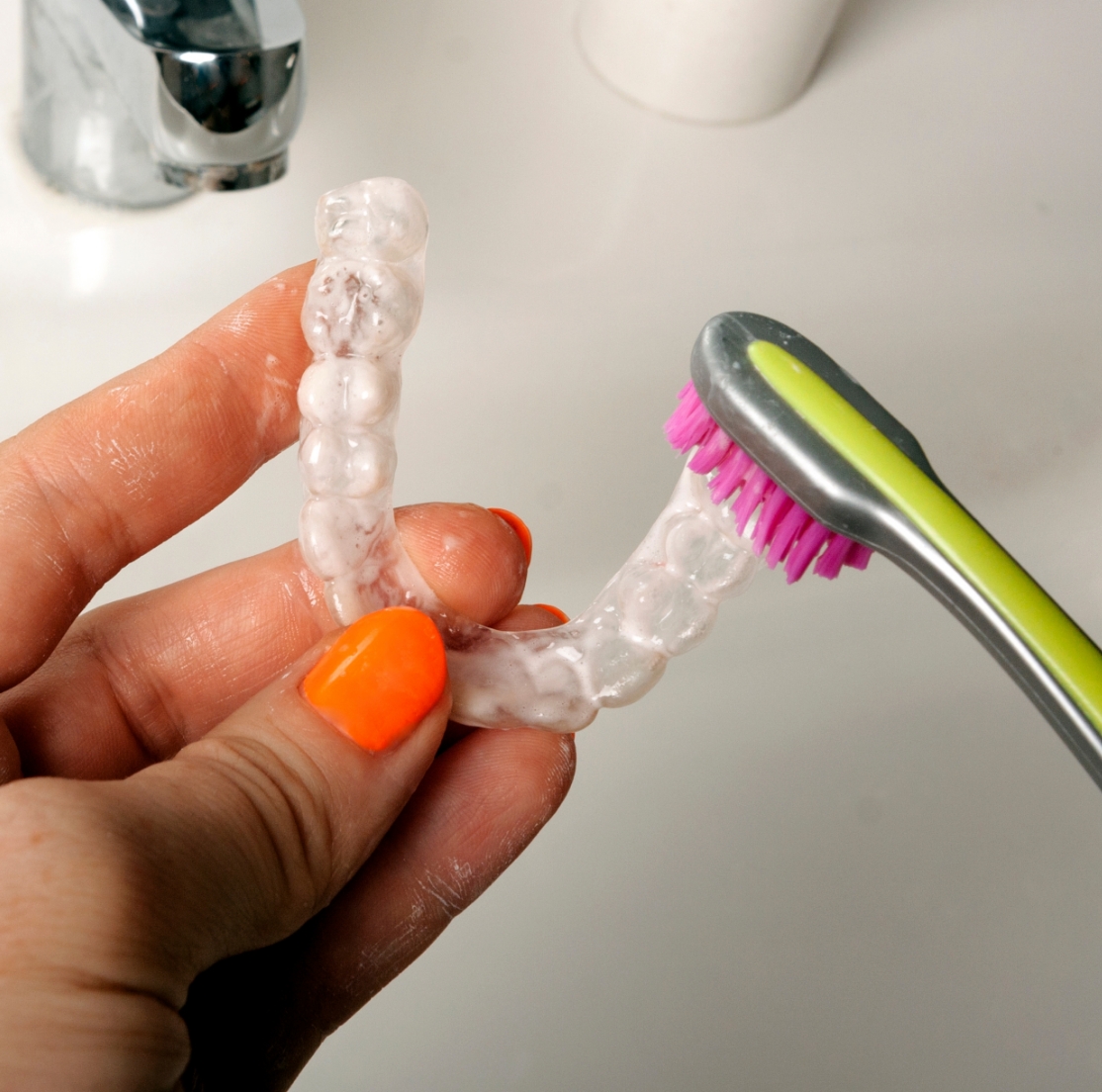DELIVERY GUIDE

Oral Appliance Delivery Guide
To get the best results from your oral appliance, it’s important to follow the instructions below. Your Wellness Associate will check in with you within a week of delivery to see how things are going.
Getting Started With Your Appliance
Give yourself one week to adjust to wearing your appliance nightly before making any changes. Once you’re comfortable, you can begin making small adjustments to improve symptoms like snoring or sleep disruptions.
- Wear every night for the first week before adjusting.
- Only advance the device if symptoms persist (e.g., snoring).
- Each appliance is unique—use your device tracker or ask your Wellness Associate for help.
- Some adjustments can be made virtually via telemedicine.

Cleaning and Maintenance
Consistent cleaning helps keep your device fresh and effective. Improper care can lead to odor, damage, or voided warranties.
- Clean daily with cool water, a soft toothbrush, and liquid soap (no toothpaste).
- Let air dry before storing to prevent bacteria and odors.
- Never use hot water, dishwashers, or leave in the sun—heat can warp it.
- Once a week, soak in an ultrasonic cleaner with cleaning crystals for 10 minutes.
- Always store in the case when not in use and keep away from pets.
- Brush and floss before inserting the device each night.
Morning Jaw Exercises
These exercises reduce morning jaw stiffness and help prevent long-term bite changes. Do them every morning after removing your appliance.
Chin Thrust:
Rest chin on fist and open mouth to allow jaw to settle back.
Chewing Gum:
Chew sugar-free gum in the morning (ideally while showering) to relax jaw muscles.
AM Aligner:
Lightly bite down on aligner for 30 seconds to verify your bite is returning to normal.

Adjunct Therapies & Supplements
These optional tools and supplements can enhance your sleep quality and oral appliance results.
Rubber bands:
Help train your mouth to stay closed.
Dry mouth gel and nose supports:
Improve comfort and breathing.
Saline rinse + Flonase:
Clear nasal passages and reduce inflammation from allergies.
Allergy support:
OTC meds or allergist consults may improve sleep quality.
Acid reflux:
Consider OTC antacids like Prevacid to reduce airway inflammation.
Melatonin (≤3mg):
Helps regulate your sleep cycle.
Other aids:
Valerian root, GABA, chamomile, CBD may help—but avoid daily use of Benadryl or similar.
Magnesium glycinate (120mg):
Calms the nervous system before bed.
Vitamin D:
Supports sleep—supplement if levels are below 30 (aim for 60–80).
B Vitamins:
Boost energy and mood—take in the morning.
Thyroid/Iron Testing:
Helps rule out fatigue and restless legs as sleep disruptors.
Medication Review:
Many depression or anxiety meds affect sleep—review them yearly with your provider.
Healthy Sleep Habits
Practicing good sleep hygiene improves treatment results and your overall sleep quality.
- Only go to bed when sleepy. Do something relaxing if you’re not tired.
- If you can’t fall asleep in 20 minutes, get up. Return when you feel sleepy again.
- Create a relaxing nighttime routine. Consistency signals your brain it’s bedtime.
- Keep a consistent sleep/wake schedule—even on weekends.
- Avoid naps if you have insomnia. If necessary, keep naps short and scheduled.
- Stick to regular daily habits (meals, chores, medications).
- Use your bed only for sleep and intimacy.
- Limit caffeine after lunch and avoid alcohol or nicotine close to bedtime.
- Don’t go to bed too full or too hungry.
- Exercise daily, but avoid vigorous workouts 6 hours before bed.
- Use sleep aids cautiously. Avoid long-term use and never mix with alcohol.
- Manage stress during the day, not at bedtime. Try mental exercises if you can't fall asleep.
- Keep your bedroom dark, quiet, and cool (62–68°F).
- Avoid screens during the last hour before bed. Read a book instead.
Frequently Asked Questions
Make sure you have been adjusting your appliance accordingly. Try using rubber bands with your appliance. Use the SnoreLab app to keep track of your snoring and its improvement.
Follow-ups are VERY important! They are required for the warranty on your device and to help maintain its integrity. They are also the best way to ensure the treatment is working as planned. Additionally, it gives us the opportunity to correct any mishaps.
We provide you with instructions on how to better care for your device to maximize its lifetime. However, we recommend changing it every 5 years.
Your device typically has a 3-year manufacturer warranty for any damage that happens while in your mouth.
The amount of sleep you need depends on your age. In general, children and teens need more sleep than adults. The American Academy of Sleep Medicine recommends that you get the following amount of sleep on a regular basis:
- Infants 4 months to 12 months should sleep 12 to 16 hours per 24 hours (including naps).
- Children 1 to 2 years of age should sleep 11 to 14 hours per 24 hours (including naps).
- Children 3 to 5 years of age should sleep 10 to 13 hours per 24 hours (including naps).
- Children 6 to 12 years of age should sleep 9 to 12 hours per 24 hours.
- Teenagers 13 to 18 years of age should sleep 8 to 10 hours per 24 hours.
- Adults should sleep 7 or more hours per night.
These are general recommendations. There is individual variability in sleep need.
The primary cause of feeling tired or sleepy during the day is insufficient sleep. If you still feel tired after treating your OSA other sleep disorders such as narcolepsy should be ruled out. Sleepiness can also be a symptom of mood problems such as depression. Some medications also can cause you to feel tired. You should talk to your medical provider to identify the reason why you continue to feel so tired.
There may be a transitional period in which dreams increase after treatment. This is normal, however if it persists, please let us know.
Acting out dreams during sleep is a warning sign for REM sleep behavior disorder. It causes you to act out vivid dreams as you sleep. The dreams tend to be action-packed. You may punch, kick, jump or get out of bed and run. All of this occurs while you are still asleep. Injuries during these events are common. Normally your brain paralyzes most muscles during the stage of rapid eye movement sleep. REM sleep is the stage of sleep when you have most dreams and nightmares. REM sleep behavior disorder occurs when the brain fails to tell the muscles to remain still. Please let us know if this worsens or continues.
If You’re Experiencing Pain or Discomfort
Some minor soreness is normal as your mouth adjusts. But persistent pain is not. Don’t wait—contact us! We have additional therapies and tips to improve comfort and fit. You can also send photos and a quick explanation to your Lucid Associate.
.avif)